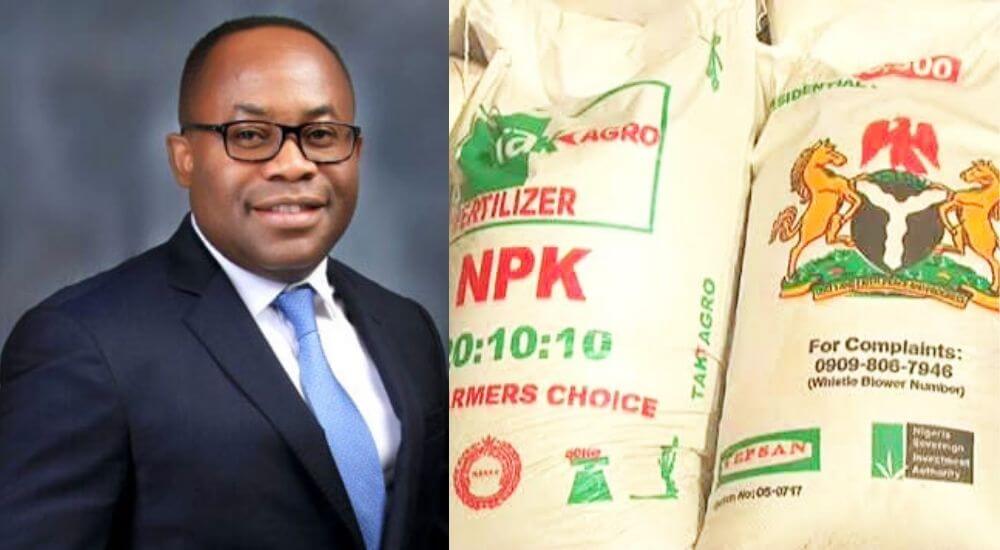The Nigerian Sovereign Investment Authority said it has increased the moribund fertilizer blending plants in the country to 72 and has created over 50,000 jobs through the Presidential Fertilizer Initiative (PFI).
The NSIA also said it has transformed the sector that depended on heavy subsidies to return a profit at the end of 2021.
Advertisement
MD/CEO, Nigeria Sovereign Investment Authority (NSIA), Mr. Uche Orji, disclosed this while briefing the press on the Presidential Fertilizer Initiatives.
The PFI is an initiative of President Muhammadu Buhari aimed at delivering quality fertilizer in time to Nigerian farmers.
Until the fertilizer initiative, the country imported the fully blended NPK fertilizer from Russia and other countries.
The country had spent a lot on subsidizing the NPK fertilizers which were not reaching farmers in the villages, according to Orji.
Advertisement
But the need to make the product- the NPK fertilizer available and affordable gave birth to the fertilizer initiative in 2016.
The PFI involves bringing Di-ammonium Phosphate from Morocco, Potash from Russia and leveraging on Dangote Fertilizer and Indorama Eleme Petrochemicals Limited for urea.
At the briefing, the NSIA boss said 60 per cent of what is required for making fertilizer is available in the country.
He explained that to harness the resources and implement the PFI, a company the PFI-NPK formerly NAIC-NPK was set up and run by the NSIA, until it was restructured in 2020.
The PFI-NPK was funded by the Real Sector Support Facility of the Central Bank of Nigeria as well as NSIA capital to import the raw materials.
Advertisement
Orji said, “Last year, the PFI programme itself turned a profit. This is separate from the NSIA profit. Think about it, years of hundreds of millions of dollars in subsidy as a restructured programme now in itself is profitable.
“The second thing is the reduction in significant use of foreign exchange. As at the end of 2020, we had 31 blending plants and all running at full utilization. At the end of 2021, we were at 64, as at today, we have just cleared an additional eight and we are at 72 blending plants. Four was actually what we started with, finishing the first year with seven.
“As at the end of 2020, 50,000 direct and indirect jobs were created. This is everything from transportation to blending to bagging to distribution to smallholder fertilizer sellers to people who are selling food.”
Recall that the NSIA in 2021 revealed that $350m was saved from payments on subsidy and import substitution through the implementation of the PFI.
The NSIA CEO while counting the gains of the investment in the fertilizer programme disclosed that a total of N232bn was received from 23 blending plants, adding that the NSIA balance sheet is not at risk.
Between 2017 to 2020, the NSIA invested a total of N221bn in the PFI.
Advertisement
The PFI programme operator and fund manager, invested N104bn in the scheme between 2017 and 2019, while an additional N114bn was invested in 2020.
The NSIA boss said, “As at the end of 2021, the programme achieved a production of 1.5 million metric tonnes. It started with 300,000 metric tonnes. We were able to acquire as much as nine vessels of ammonia phosphate from OCP, six vessels of potash from Russia, 307,000n metric tonnes from Indorama. All of these came through NPK into 52 fertilizer blending plants at the end of 2021.
“We received over a N100bn in bank guarantee from 23 plants and a N132bn in cash from those plants. The industry is now investing. This is not NSIA capital. The restructuring (of PFI-NPK) has removed any risk to the NSIA balance sheet. It is now transferred to the blenders.
“We came to revive, step back and let the industry run itself. And this is the step-by-step transformation in the PFI. So, at the moment, we are facilitating but our balance sheet is not at risk.”



